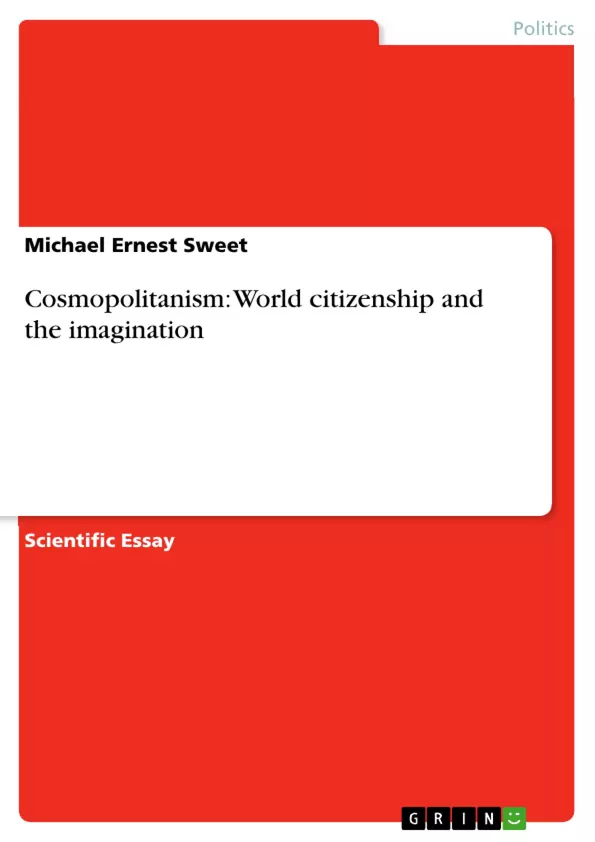This paper examines the idea of world citizenship and if it is both possible and desirable; if it is to be understood as an abstraction or a framework for action. I consider a number of common notions of world citizenship and then, supported by Nussbaum’s theory of public rationality from the literary imagination, I illuminate how the cosmopolitan vision of Diogenes, kosmopolitês (cosmopolitanism), may present the most promising construct of world citizenship to act as a counter hegemonic citizen-based force to neoliberal globalization. Additionally, a review of the world citizenship teaching model Learning for a Cause elucidates the potential for my vision of kosmopolitês in practice. I find world citizenship to be crucial to contemporary society, but in need of (re)understanding.
Inhaltsverzeichnis (Table of Contents)
- Cosmopolitanism: World Citizenship and the Imagination
- World Citizenship: A Common (Mis)Understanding
- Framing a Need for World Citizenship
- Diogenes, kosmopolitês: An Approach to World Citizenship
- The Literary Imagination: Nussbaum’s Public Rationality
- Learning for a Cause: A World Citizenship Curriculum
- Conclusion
Zielsetzung und Themenschwerpunkte (Objectives and Key Themes)
This paper explores the concept of world citizenship, investigating its feasibility and desirability. It examines whether world citizenship should be viewed as an abstract idea or a framework for practical action. The paper draws on the theories of Martha Nussbaum and Diogenes, arguing that the cosmopolitan vision of Diogenes offers a promising model for world citizenship, acting as a counter-hegemonic force against neoliberal globalization.
- The concept of world citizenship and its implications for global society
- The role of the imagination in shaping a cosmopolitan vision
- The potential of world citizenship as a framework for action against neoliberal globalization
- The importance of education and curriculum development in fostering a sense of world citizenship
- The ethical and practical challenges of achieving a truly cosmopolitan society
Zusammenfassung der Kapitel (Chapter Summaries)
- World Citizenship: A Common (Mis)Understanding: This chapter introduces the idea of world citizenship and its relevance in a globalized world. It examines the growing interconnectedness across borders and the changing nature of citizenship in light of transnational corporations, non-governmental organizations, and the increasing influence of individuals on a global scale. The chapter also discusses the potential for world citizenship to contribute to a just and sustainable future.
- Framing a Need for World Citizenship: This chapter explores the urgent need for a global response to issues such as climate change, poverty, and inequality. It argues that these challenges require a collective effort and a sense of shared responsibility among all members of the global community. The chapter also highlights the importance of fostering a sense of shared humanity and promoting ethical action on a global scale.
Schlüsselwörter (Keywords)
The main keywords and focus topics of this text include world citizenship, cosmopolitanism, globalization, neoliberal globalization, imagination, public rationality, ethics, education, curriculum, human flourishing, and global justice.
Frequently Asked Questions
What is the core concept of world citizenship?
World citizenship, or cosmopolitanism, suggests that all human beings belong to a single community based on shared morality, transcending national or local identities.
How does Diogenes define the "kosmopolitês"?
Diogenes of Sinope famously declared himself a "citizen of the world," challenging traditional city-state allegiances and promoting a universal human identity.
What is Martha Nussbaum's theory of literary imagination?
Nussbaum argues that literature fosters "public rationality" by allowing individuals to imagine the lives of others, thereby developing the empathy needed for world citizenship.
Can world citizenship counter neoliberal globalization?
The paper suggests that a citizen-based cosmopolitan vision can act as a counter-hegemonic force against the purely economic focus of neoliberal globalization.
What is "Learning for a Cause"?
It is an educational teaching model designed to put the principles of world citizenship into practice through curriculum development and social action.
- Arbeit zitieren
- Graduate Student Michael Ernest Sweet (Autor:in), 2006, Cosmopolitanism: World citizenship and the imagination, München, GRIN Verlag, https://www.grin.com/document/76513



